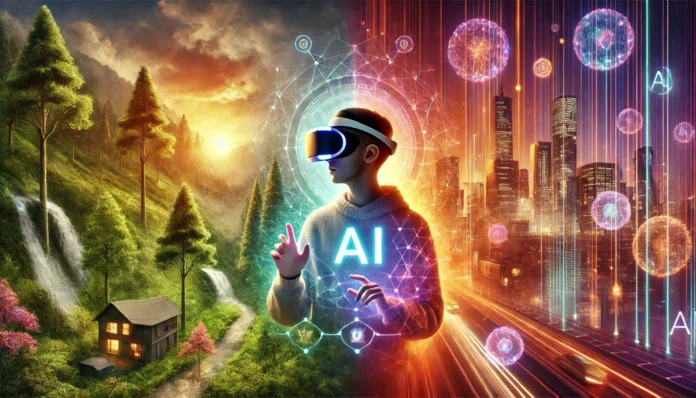Virtual Reality (VR) has long promised to transport users into hyper-realistic, immersive worlds. However, the technology’s true potential has been unlocked through the integration of Artificial Intelligence (AI), which is enhancing VR’s capabilities in ways previously imagined only in science fiction. AI is enabling VR systems to create environments that adapt, respond, and evolve in real-time, offering experiences that are more engaging, personalized, and intuitive than ever before.
The Synergy of AI and VR
The combination of AI and VR takes immersive experiences to a whole new level by merging human-like decision-making with visually engaging worlds. While VR provides the environment, AI powers the intelligence that makes these environments interactive. This marriage of technologies opens the door to endless possibilities in gaming, training, education, healthcare, and beyond.
How AI Enhances VR
- Real-Time Interactivity: AI-driven systems allow VR environments to respond to users’ actions, adapting dynamically based on the individual’s behavior or choices.
- Personalization: AI customizes VR experiences by learning from the user’s preferences, adjusting everything from visual aesthetics to challenges and tasks in virtual games.
- Adaptive Environments: AI enables VR worlds to evolve, making them feel more alive by introducing variables such as changing weather, NPC (non-player character) behavior, and narrative twists in real-time.
AI in Gaming: Elevating Immersion
One of the most popular and groundbreaking applications of AI-powered VR is in the world of gaming. AI creates not just interactive, but adaptive gaming experiences, providing players with environments that respond intelligently to their actions.
Example: AI-Driven NPCs
- Advanced NPC Behavior: AI has made NPCs smarter, allowing them to interact with players more realistically. Games like Red Dead Redemption 2 use AI to make NPCs more life-like, reacting differently based on the player’s choices, environment, and emotional tone.
- Procedural Content Generation: AI can generate entire worlds and storylines dynamically, adapting them based on a player’s actions, ensuring that no two gaming experiences are alike.
Future Possibilities
The next frontier in gaming could involve AI that analyzes players’ skills, tailoring game difficulty or creating personalized quests that continuously challenge and engage the gamer.
AI-Powered Training and Simulations
Beyond entertainment, AI-enhanced VR is revolutionizing training in various sectors by offering hyper-realistic simulations that provide valuable hands-on experience without the risks or expenses of real-world trials.
Healthcare and Surgery Simulations
- AI-driven VR platforms enable medical professionals to practice complex surgeries or procedures in virtual environments, providing feedback and suggestions on how to improve their skills.
- Osso VR offers surgeons an immersive, AI-powered surgical simulation platform that helps them practice in a safe, controlled setting before performing on real patients.
Military and Emergency Response
- In defense and emergency response, VR simulations powered by AI enable soldiers or first responders to experience high-stakes scenarios like combat or natural disaster responses in an interactive, virtual setting.
- Boeing uses AI-powered VR simulations to train its technicians in aircraft maintenance, providing them with real-time instructions and feedback as they perform virtual repairs.
AI in Education: Revolutionizing Learning Experiences
AI-powered VR has the potential to change the way we learn, offering customized educational experiences that cater to different learning styles and abilities.
Immersive Learning Environments
- AI-driven VR education allows students to explore historical events, scientific concepts, and geographical locations firsthand. For example, ClassVR offers virtual field trips and interactive lessons tailored to the curriculum.
- AI personalizes these experiences by analyzing a learner’s progress and adjusting the difficulty level of tasks or simulations, ensuring that each learner can absorb information at their own pace.
Real-World Application in Skill Development
- Skill training in areas like architecture, engineering, and art benefits immensely from AI-powered VR, as students can practice in virtual environments that replicate real-world challenges.
- Platforms like Labster provide virtual science labs powered by AI, allowing students to experiment and learn in a simulated but highly interactive environment.
Challenges and Ethical Considerations
As AI continues to shape the future of VR, several ethical challenges must be addressed.
- Privacy Concerns: AI in VR can gather vast amounts of personal data through behavior tracking, raising questions about how this data is collected, stored, and used.
- Addiction and Escapism: As VR becomes more immersive, concerns grow about the potential for users to spend excessive amounts of time in virtual worlds, leading to detachment from reality.
- Bias in AI Algorithms: Just as with any AI system, there is a risk of bias in how AI models are trained, which could affect how users experience virtual environments, especially in education and training scenarios.
The Future of AI-Enhanced Virtual Reality
The fusion of AI and VR holds incredible promise for the future, with potential applications in nearly every sector—from entertainment and education to healthcare and workplace training. By creating virtual worlds that are not only visually captivating but also responsive, adaptive, and personalized, AI is elevating VR to new heights, enabling more immersive and practical experiences than ever before.
As these technologies continue to evolve, the future may bring even more innovative and dynamic uses of AI in VR, pushing the boundaries of human experience and interaction. Whether for entertainment, education, or professional training, AI-powered VR has the potential to be an integral part of our everyday lives.





